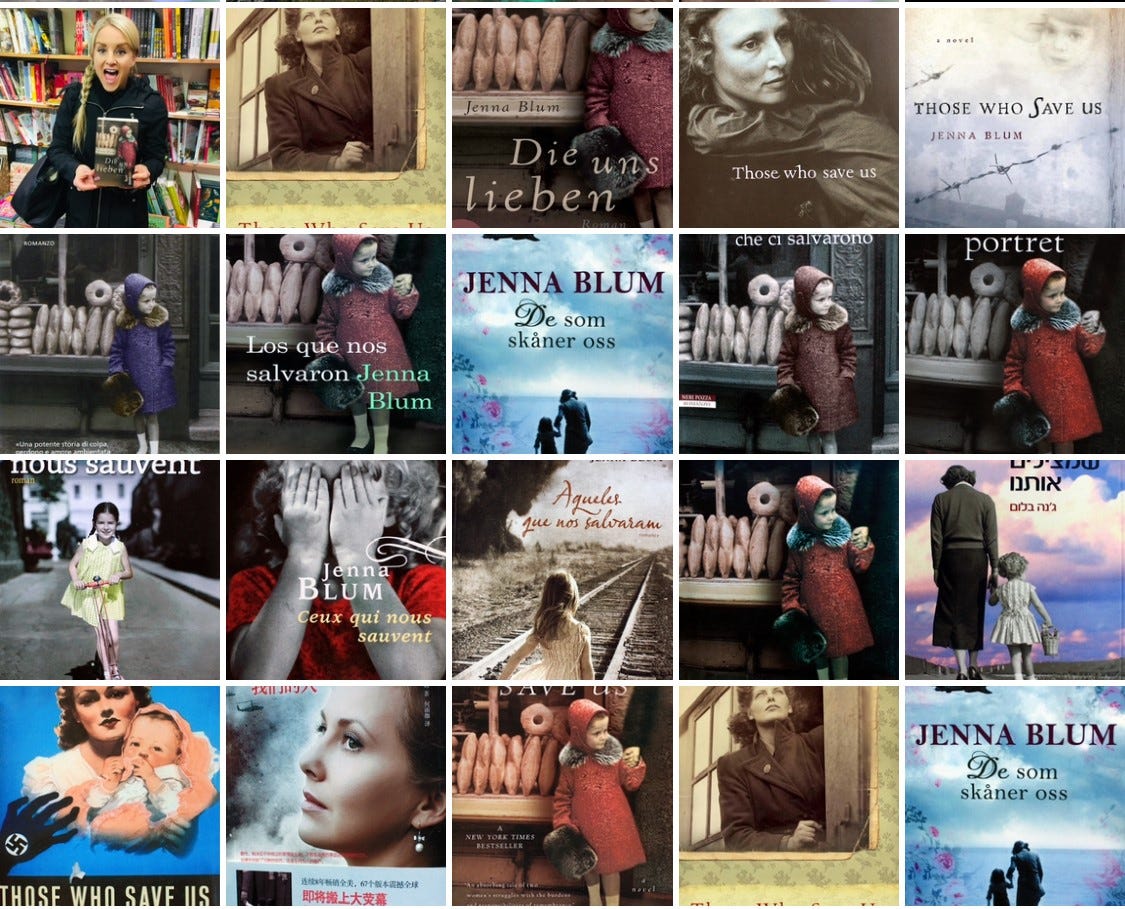Gentle Grit
Tenacity Tale: Jenna Blum on the Twentieth Anniversary of her Debut Novel, Befriending Her Doubt, and Setting A Mighty Blaze
Our April Tenacity Tale is Jenna Blum, CEO and cofounder of The Mighty Blaze and author of the memoir Woodrow on the Bench (2021), and the novels The Lost Family (2017), The Stormchasers (2010), and Those Who Save Us (2004), about a professor trying to untangle the truth about her German heritage in “a profound exploration of what we endure to survive and the legacy of shame.”
The story of Jenna Blum’s debut novel, Those Who Save Us, is the stuff of legends, and not just because the book has stayed in print for twenty years—though any book that remains in print that long is already tenacity incarnate—but because the book was so slow out of the starting gate.
The novel was published on April 1, 2004 and given a loving hometown kick-off—a reading at Brookline Booksmith and a festive after-party at Boston’s only German beer hall, Jacob Wirth’s, where Blum’s well-wishers gathered around an upright piano for a boisterous sing-a-long to launch her debut into the wide, wide world.
But then Those Who Save Us stalled so completely that Blum dubbed the hardcover “the friends and family edition,” but she wasn’t about to let more than a decade spent researching, writing, and revising fade away—she’d worked too hard, and the story was too important.
So, Blum decided to do everything in her power to boost her book’s chances of finding its way to readers.
She flew all over the country as a speaker with the Jewish Book Council doing more than thirty events, and, in a grassroots push of proportions so epic they boggle the mind, she visited more than eight hundred book clubs—yes, eight hundred.
As a result, Those Who Save Us hit the New York Times bestseller list in October 2007, three-and-a-half years after its initial publication, inspiring Publishers Weekly to call the novel “the little book that could.” Those Who Save Us went on to earn Blum a spot as one of Oprah Winfrey’s Top Thirty Women Writers, win the 2005 Ribalow Prize judged by Elie Wiesel, get published in more than twenty countries, and—as of April, 2024—spend twenty continuous years in print.
But while Blum’s efforts chugga-chugga-chugged the book onto the best seller list, Blum’s tenacity stretched well beyond the New York Times.
“A career as a writer requires two things—talent and tenacity,” Blum says. “You need to be adept with language and have an interest in words, of course—if you’re not loving words, go do something else—but it also requires grit.”
For Blum, though, grit isn’t about slogging away every day for hours—it’s about being brave enough to keep coming back to the work, whatever that looks like for you. And, for Blum, grit took many forms:·
Grit was deciding to put the short story collection she was working on aside when she realized the final story in the collection actually wanted to be the novel that would go on to become Those Who Save Us
Grit was sticking with the modern story for Trudy, the daughter in Those Who Save Us, even when it took five times as long to finish as the historical story for her mother, Anna—2.5 years verses six months.
Grit was pushing her editor to allow her to rewrite a portion of Trudy’s story a month before final edits were due because she suddenly unlocked the key to her character.
Grit was deciding that her first agent was wrong to drop Blum—the agent told her Those Who Save Us was too depressing for a debut—and querying until she found the agent who not only loved the novel enough to sell it but continues to represent Blum to this day.
Grit was deciding as the pandemic closed down the world in 2020 that it was unacceptable for writers who she loved to have their tours canceled.
“Tour isn’t just a chance to sell a book, it’s a way to connect to readers and celebrate them,” Blum said. “It was like watching the sign in Grand Central station flip as one event after another was cancelled. All those books were candles that were being snuffed out, and I thought if we could save enough books we could make a mighty blaze.”
At the same time, author Caroline Leavitt had launched the “Nothing is Canceled” blog tour, and Blum and Leavitt decided to team up to create A Mighty Blaze, a virtual venue for author interviews across all genres. More than four years later, A Mighty Blaze is still providing a virtual venue for hundreds of writers a year.And finally, grit was gently, gently making peace with a writing process that involved years of research and planning while she waits for the emotional spark to zap the idea to life. “I used to think this was a block, but I’ve realized that something is germinating beneath the surface while I’m doing all that research,” Blum says.
Most importantly, as Those Who Save Us celebrates its twentieth anniversary, Blum has learned that grit and self-care can coexist to create a writing process that feels more like something of a gentle grit.
“As I get older, I’m not going to write on three hours of sleep anymore,” Blum said. “I’m not going to work until 4 p.m. before I eat anything. And I’m not going to beat myself up. You have to make friends with writer’s doubt because it will never go away. It does shrink, but it doesn’t go away.”

The Opening Paragraphs of Those Who Save Us
The funeral is well attended, the New Heidelburg Lutheran Church packed to capacity with farmers and their families who have come to bid farewell to one of their own. Since every seat is full, they also line the walls and crowd the vestibule. The men are comically unfamiliar in dark suites; they don’t get this dressed up for regular services. The women, however, wear what they do every Sunday no matter the weather, skirt-and-sweater sets with hose and pumps. Their parkas, which are puffy and incongruous and signify the imminent return to life’s practicalities, are their sole concession to the cold.
And it is cold. December in Minnesota is a bad time to have to bury a loved one, Trudy Swenson thinks. In fact, it is quite impossible. The topsoil is frozen three feet down, and her father will have to be housed in a refrigeration unit in the county morgue until the earth thaws enough to receive him. Trudy tries to steer her mind away from how Jack will look after several months in storage. She makes an attempt to instead concentrate on the eulogy. But she must be suffering the disjointed cognition of the bereaved, for her thoughts have assumed a willful life of their own. They circle above her in the nave, presenting her with an aerial view of the church and its inhabitants: Trudy herself sitting very upright in the front row next to her mother, Anna; the minister droning on about a man who, from his description, could be any fellow here; the deceased looking dead in his casket; the rest of the town seated behind Trudy, staring at the back of her head. Truly feels horribly conspicuous, and although she means her father no disrespect, she prays only for the service to be over.
Tenacity Tales is HIBOU’s monthly celebration of the tiny tenacities in a writerly life. If you have a tenacity tale you’d like to share, comment below or send me your pitch at hibou@substack.com. To learn more about what we’re looking for, read the original Tenacity Tale here.
Subscribe to HIBOU for regular—and free!— content about writers on the hunt for the wise (and wisecracking) writing life!





Needed to hear this story of grit and tenacity today as my book takes me in yet another unexpected direction!
I needed this today. And I feel that on a regular basis with your posts. So thank you, and thank you again on a grander scale.